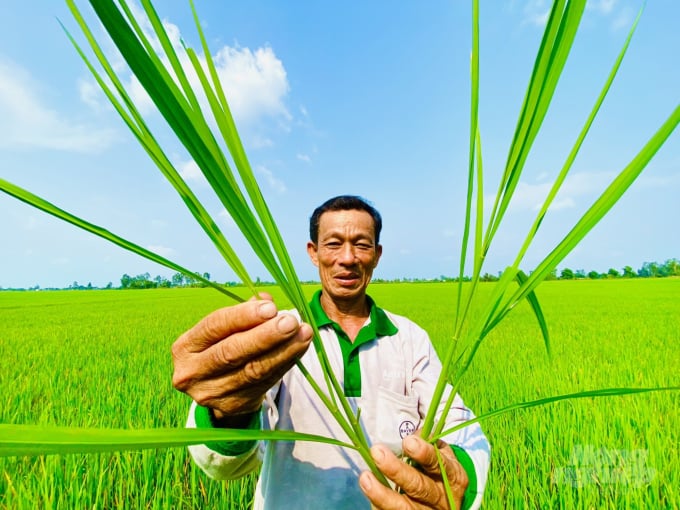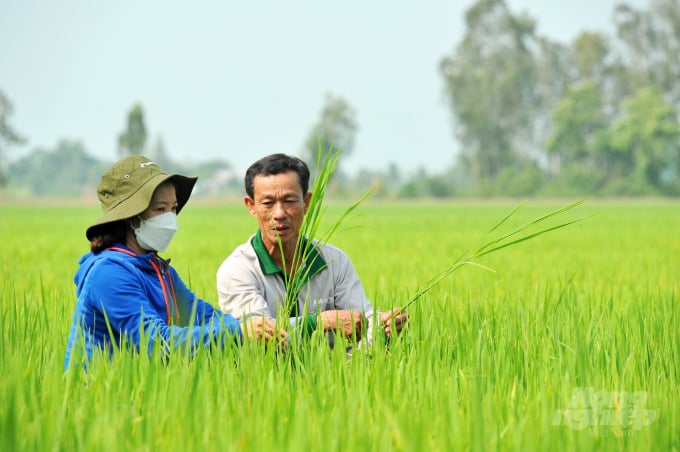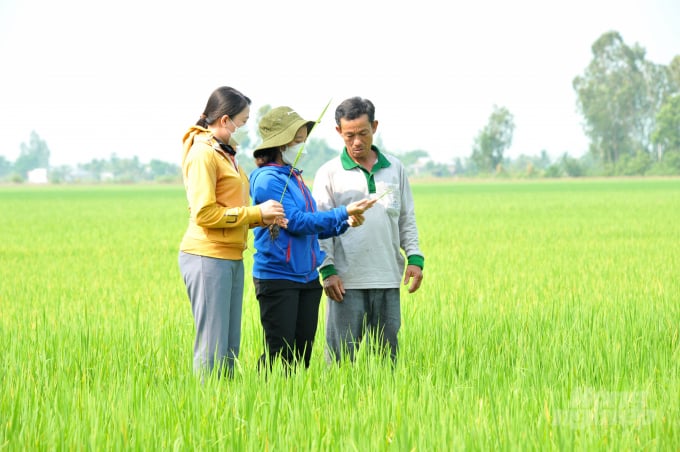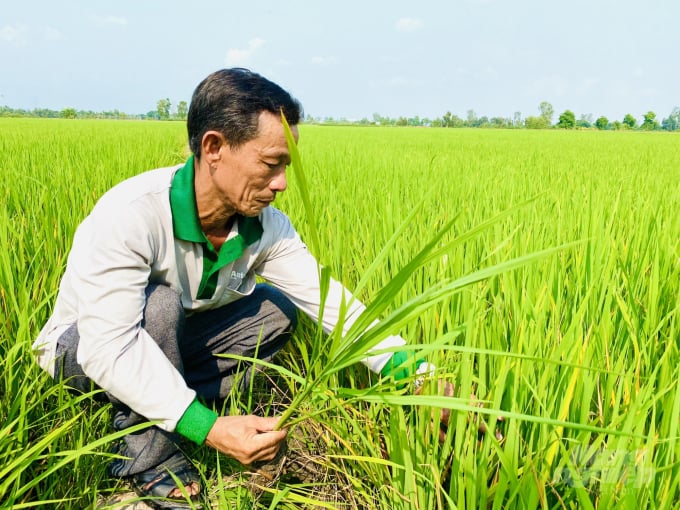May 24, 2025 | 16:22 GMT +7
May 24, 2025 | 16:22 GMT +7
Hotline: 0913.378.918
May 24, 2025 | 16:22 GMT +7
Hotline: 0913.378.918
Organic production is necessary for Vietnam's agricultural industry today. From that orientation, Can Tho City's Department of Cultivation and Plant Protection (DCPP) in collaboration with Co Do district DCPP is implementing a model of "sustainable rice production in the organic direction" at Toan Phat Cooperative, Thanh Phu Commune, Co Do District.

Farmer Nguyen Danh Dung from Thanh Xuan hamlet, Thanh Phu commune, Co Do district, by his 4ha field of organic rice field which is found very well growing and less affected by pests and diseases. Photo: Le Hoang Vu.
The model is carried out on 10ha of rice. After selecting a significant site for experimenting, the Can Tho DCPP, together with the Co Do District DCPP office organized training courses to guide technical methods of organic rice cultivation for farmers. During the implementation of the model, the farmer households have to follow an organic rice production process with a low density of sowing seeds from 12-14 kg/work, applying alternately the sowing and irrigating tools with the use of 100% organic fertilizers and reducing from 2-3 times of pesticide spraying.
Farmer Nguyen Danh Dung from Thanh Xuan hamlet, Thanh Phu commune (Co Do district) who has about 4ha of rice cultivated following the organic model, excitedly said: " In nearly 30 years, local rice farmers all use chemical fertilizers and pesticides 'from A to Z' steps, so rice production has not been successful anymore. Pest attacks are more and more rampant and had forced growers to spend much money on pesticides."
"In fact, the more they spend on fertilizers and pesticides, the less profit they can get. Particularly in the last winter-spring rice crop, the price of materials kept increasing so my family had to mobilize more effort to take care of the rice to minimize the cost of hiring labor. However, at the end of the crop, we could only make a profit of about VND1.5-2 million/working session," Dung confided.

In the summer-autumn rice crop 2022, the Can Tho DCPP and Co Do District DCPP office have implemented the organic rice model on a 10ha of Toan Phat Cooperative. Photo: Le Hoang Vu.
In the summer-autumn rice crop 2022, Dung's family has been selected by the Co Do district's agricultural sector to pilot the organic rice cultivation model on an area of 4ha of rice variety OM 5451. His rice field has been growing for 53 days just using organic fertilizers and so far has been less affected by pests and diseases so Dung has never had to spray pesticides.
Mr. Dung said since starting to produce rice in the organic direction, farmers feel pleasant welcoming agricultural engineers visit their fields every 2-3 days directly guiding them in the use of rice farming techniques.
Moreover, farmers can make more profit by reducing much of the sowing seeds. Instead of using 25kg of rice seed/work, now they can reduce it to 12-14 kg/work. The amount of fertilizers has also decreased. Instead of using 60kg of fertilizer/crop (1,000m2) before, now farmers only use just 50kg of organic fertilizer per crop and the rice is growing very well.
Mr. Dung assessed that, up to this point, the application of the organic rice farming model has helped lessen pests and diseases, and reduce costs by about VND320,000/work. As a result, he and many other farmers in the district expect this year's summer-autumn rice crop to bring them high yields.
Mr. Nguyen Phuong Dong from the same commune as Mr. Dung, who also participates in the model, said that organic rice farming has greatly reduced the environmental impacts due to pesticide bottles thrown away in the fields. In addition, farmers' awareness of organic fertilizers has also been raised. "During the implementation of the model, from planting, tending to harvest, my relatives and I always feel secure, without fear of harm when working on the fields," said Dong excitedly.
Ms. Nguyen Thi Bich Tran, Deputy Head of the DCPP of Co Do District, Can Tho City, said: "Currently, the district's DCPP office is redirecting, encouraging, and guiding farmers to follow organic rice farming to reduce the number of inorganic fertilizers applied to the field so that to ensure the creation of clean, safe and environmentally friendly rice products, at the same time improve the nutritional properties in the soil for intensive rice cultivation.

Farmers following the organic rice model have reduced a lot of costs and been guided by technical guidance from the agricultural staff "from A to Z" in their farming. Photo: Le Hoang Vu.
In addition, changing to using organic fertilizers as a primer at the beginning of the crop has helped reduce the number of inorganic fertilizers.
The model applied in the summer-autumn crop has so far helped farmers reduce much of input costs compared to the traditional method using only chemical fertilizers.
According to Ms. Tran, to achieve more good results, the Co Do district DCPP office and the Can Tho City DCPP are actively monitoring this pilot model to get specific records after the summer-autumn crop.

A farmer checks his organic rice field. Photo: Le Hoang Vu.
These will be the first steps for farmers in Co Do district to change from traditional to organic rice cultivation, contributing to reducing production costs, increasing profits, and preserving the sustainable ecological environment for the fields to create safe and high-value rice products.
"The organic rice production model has helped local farmers feel the risks of overuse of chemical fertilizers and pesticides, affecting the quality of agricultural products, the environment, and public health so it has received a very high response from them.
The model implemented at localities has partly met the needs of producers and consumers and opened up a sustainable farming direction. In the coming time, the DCPP will deploy it in many other areas for farmers," said Ms. Tran Thi Kim Thuy, deputy director of Can Tho city DCPP.
Translated by Linh Nguyen

(VAN) The People's Committee of Tra Vinh province has approved an adjustment to the investment policy for the Green Hydrogen Plant project, increasing its area to approximately 52.76 hectares.
![Reducing emissions from rice fields: [2] Farmers’ commitment to the soil](https://t.ex-cdn.com/nongnghiepmoitruong.vn/608w/files/news/2025/05/05/dsc08881jpg-nongnghiep-140632.jpg)
(VAN) Clean rice cultivation model in Thuong Tan commune, Bac Tan Uyen district, is assisting local residents in achieving sustainable agriculture by substantially reducing costs, increasing productivity, and protecting the environment.

(VAN) At the conference to disseminate Resolution No. 68, AgriS introduced its digital agricultural ecosystem and reaffirmed its commitment to accompanying the Government in promoting private sector development and sustainable agriculture.

(VAN) 'Blue Ocean - Blue Foods' initiative is designed to restore marine ecosystems and establish sustainable livelihoods for local communities by cultivating a minimum of 1,000 hectares of cottonii seaweed in the first three years.
/2025/05/21/4642-3-112707_603.jpg)
(VAN) The V-SCOPE project has made direct contributions to three out of six pillars of the Comprehensive Strategic Partnership between Vietnam and Australia.

(VAN) Facing the threat of rabies spreading to the community, Gia Lai province urgently carries out measures to vaccinate dogs and cats on a large scale.

(VAN) Disease-free livestock farming not only protects livestock herds but also stabilizes production and livelihoods for many farmers in Tuyen Quang.